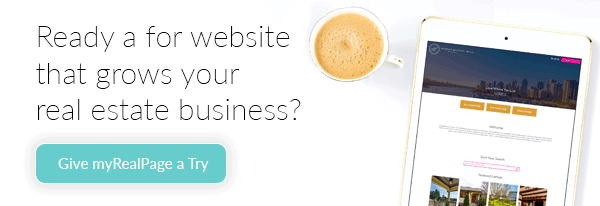10 Must-Haves For a Lead-Generating Real Estate Website

Yes, a real estate website takes work. But a real estate website also works for you — by generating leads.
Like a piece of machinery, a lead-generating real estate website needs certain components to run properly and produce results.
Here are 10 must-haves for a lead-generating real estate website.
Search Engine Optimization
Before you can generate leads from your website, you need to generate traffic to your website.
That’s why search engine optimization — SEO — is so important. Specifically, organic SEO. Organic SEO is what enables people to search for something via a search engine and find your website high enough in their results that they click through. Check out our guide on how to get more real estate website traffic (including how to maximize organic SEO for your real estate website).
A Clear-Cut Value Proposition
Visitors to your website should leave with an understanding of who you are as a real estate agent and what makes you different. This is where a unique value proposition comes in.
Your real estate unique value proposition answers a prospective client’s biggest question — “why should we hire you?”
The “about me” page on your website is the most obvious place to work in your value proposition, but it can be part of your key messaging throughout your website.
IDX or DDF
Prospective real estate clients are mainly in search of real estate listings when they come to your real estate website.
This is where IDX or DDF come in handy.
IDX and DDF — Internet Data Exchange and Data Distribution Facility — are data feeds that let real estate agents display live listings on their own websites. They allow your real estate website and real estate boards to communicate with one another in order to keep those listings up to date.
You can read about the differences between IDX and DDF here but both feeds serve the same purpose: they let visitors access the same details about a listing that would be available on the MLS.
The result: prospective buyers and sellers can find exactly what they’re after on your real estate website. And the longer they’re on your site, the better chance you have of turning them into a lead.

Strong Search Capability
Displaying live listings is one key to a lead-generating real estate website. Giving your visitors the ability to conduct customized listing searches on your website is another.
That’s made possible by VOW, or Virtual Office Website.
While IDX and DDF give you the ability to display up-to-the-minute listings, VOW lets you give your website visitors direct access to the MLS from your website.
When you have VOW enabled on your website, visitors can save listings, conduct personalized searches, filter results, search by map, see properties as soon as they’re listed and view much more detailed information than what’s available on public-facing listing websites.
Here’s what makes VOW a lead generator: visitors have to sign up on your website in order to use the search and save options. Boom — you’ve got contact information and a lead to follow up with.
Read more about VOW for real estate websites here.
Key Content Pages
Content marketing not only helps boost traffic to your real estate website, but also plays a role in converting visitors to leads.
High-quality content that delivers the kind of useful information your visitors are already looking for gives them a reason to stay on your site for longer, increasing your odds of getting them to follow a call-to-action. It’s also a display of your expertise.
A real estate blog is one spot for this kind of content. You can also create additional pages on your website for key content such as profiles of neighbourhoods in your market or monthly market statistics.
Lead Capture Forms
A lead isn’t a lead if you don’t capture their contact information.
Your real estate website should have multiple opportunities for a lead to fork over some personal information and permission to be contacted.
Enter lead capture forms.
Lead capture forms are areas of your website where a lead provides their information in exchange for something.
Examples of lead capture forms for real estate agents include:
- Newsletter sign-ups
- Free downloadable content (such as market reports)
- “Request a call” forms
- “Contact me” forms
- VOW access (as mentioned earlier)
CRM Integration
A real estate customer relationship management system (CRM) helps real estate agents store information about leads, track interactions and find the best ways to help convert leads into clients.
For a CRM to be truly useful, it needs to be connected to your website so that it can log the activities a lead takes on your site and add new leads to your database.
Using a real estate CRM and integrating it with your website ensures that actions taken on your website become leads you can follow up on.
Testimonials
Client testimonials can help you get more leads and deserve a spot on your real estate website.
You can dedicate a page to sharing success statistics and testimonials, or you can sprinkle testimonials throughout your site, such as at the bottom of each page.
Psst: read up on how to get a real estate testimonial by email and how to handle the dreaded negative real estate agent review.
Social Media Links
If you’re actively using a social media platform to market your real estate business, you should be linking to it from your website.
Including links to your social media profiles encourages traffic and what you share on social media just might be what convinces a potential lead to follow a call-to-action on your site.
Best practice: put any relevant social media icons in your website’s footer so that they can be accessed from any page of your website.
Contact Options
A contact form should not be the only way for a potential lead to reach you via your real estate website.
Lead-generating real estate websites maximize the ways a visitor can be in touch.
The footer of your website should include a phone number, email address and those aforementioned social media links.
Your website should have a “contact me” page that lists every way to contact you.
And each page of your site should have a call-to-action that encourages a visitor to sign up, register or contact you — anything that will give you their information and permission to be contacted.
Do you need a more complete guide? We’ve created a guide called “How to build a real estate website“. This guide will help you from getting your domain all the way to launching the website.
Last Updated on July 9, 2024 by myRealPage



